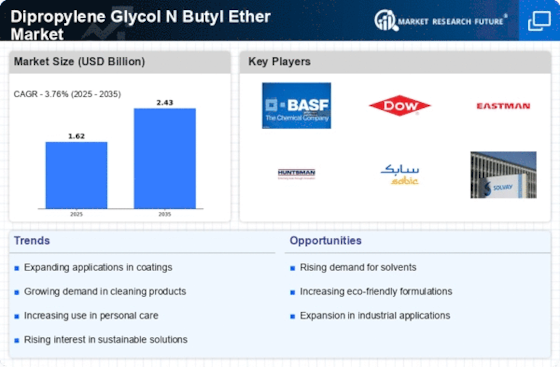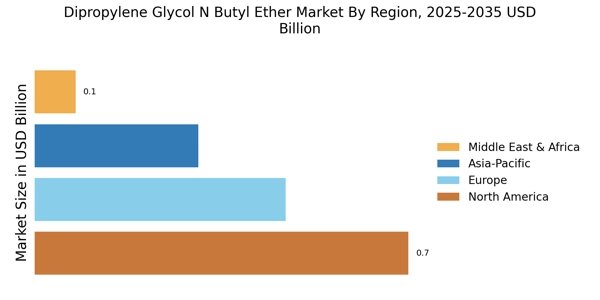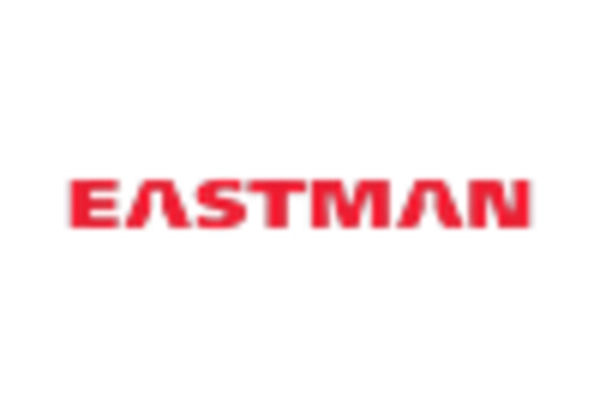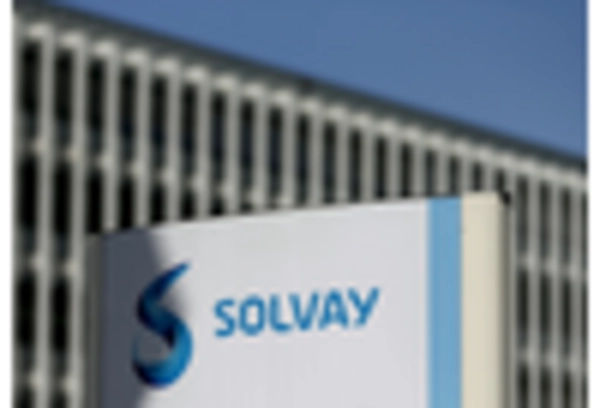Regulatory Compliance
Regulatory frameworks are increasingly influencing the Dipropylene Glycol N Butyl Ether Market. Stricter regulations regarding chemical safety and environmental impact are prompting manufacturers to adopt safer and more compliant formulations. This trend is particularly evident in the European and North American markets, where regulatory bodies are enforcing guidelines that favor low-toxicity solvents. As a result, companies are reformulating their products to include Dipropylene Glycol N Butyl Ether Market, which is recognized for its favorable safety profile. The compliance with these regulations not only enhances product acceptance but also opens new market opportunities, potentially leading to a 15% increase in market share for compliant products.
Technological Innovations
Technological advancements play a pivotal role in shaping the Dipropylene Glycol N Butyl Ether Market. Innovations in production processes, such as more efficient synthesis methods, are enhancing the quality and reducing the costs of Dipropylene Glycol N Butyl Ether Market. These improvements not only increase the availability of high-purity products but also expand their applications across various sectors, including personal care and pharmaceuticals. The market is experiencing a notable shift towards the adoption of advanced manufacturing technologies, which could potentially lead to a 10% increase in production efficiency. As a result, manufacturers are better positioned to meet the growing demand for versatile solvents, thereby driving market growth.
Sustainability Initiatives
The increasing emphasis on sustainability within the Dipropylene Glycol N Butyl Ether Market is driving demand for eco-friendly solvents. As industries seek to reduce their environmental footprint, the preference for biodegradable and low-toxicity products is rising. This shift is evident in the coatings and cleaning sectors, where formulations incorporating Dipropylene Glycol N Butyl Ether Market are favored for their reduced volatile organic compound (VOC) emissions. The market is projected to witness a compound annual growth rate (CAGR) of approximately 5% over the next few years, reflecting the growing consumer preference for sustainable products. Companies are investing in research and development to enhance the environmental profile of their offerings, which is likely to further bolster the market for Dipropylene Glycol N Butyl Ether Market.
Diverse Industrial Applications
The versatility of Dipropylene Glycol N Butyl Ether Market is a key driver in the market, as it finds applications across multiple industries. In the coatings sector, it serves as an effective solvent, enhancing the performance of paints and varnishes. The personal care industry also utilizes this compound in formulations for cosmetics and skin care products, where it acts as a solvent and skin conditioning agent. The expanding use of Dipropylene Glycol N Butyl Ether Market in cleaning products further underscores its importance. With the market for cleaning agents projected to grow at a CAGR of 4% in the coming years, the demand for Dipropylene Glycol N Butyl Ether Market is likely to increase correspondingly, reinforcing its position in the market.
Growing Demand in Emerging Markets
Emerging markets are exhibiting a growing demand for Dipropylene Glycol N Butyl Ether Market, driven by industrialization and urbanization. As economies develop, there is an increasing need for solvents in various applications, including coatings, cleaning, and personal care. Countries in Asia and Latin America are witnessing a surge in manufacturing activities, which is likely to propel the demand for Dipropylene Glycol N Butyl Ether Market. The market in these regions is expected to grow at a CAGR of 6% over the next five years, reflecting the rising consumption of chemical products. This trend presents significant opportunities for manufacturers to expand their reach and capitalize on the burgeoning demand in these markets.

















